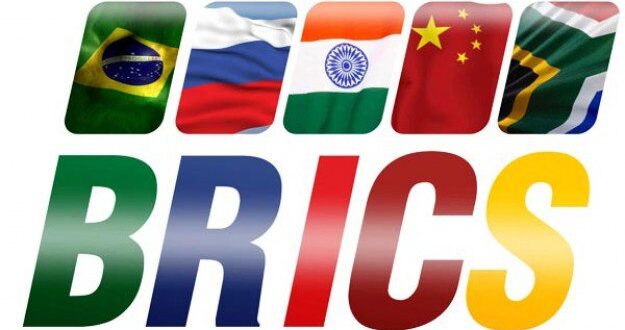Brazil, Russia, India, China, and South Africa – is expected to increase their share of the global economy to nearly 35% by 2028, Bloomberg reported on Monday.
According to Bloomberg’s calculations based on the latest International Monetary Fund (IMF) data, this year, the BRICS countries will contribute 32.1% of the world’s growth, compared to the Group of Seven nations’ (G7), 29.9%.
The G7 consisting of the U.S., UK, Canada, France, Germany, Italy, and Japan, is considered the most advanced economic bloc of countries on the planet.
The report indicated that in 2020, the contribution of the BRICS countries and the G7 to global economic growth was equal, and from that moment on, the performance of the Western countries has been declining. By 2028, the G7’s contribution to the world economy is predicted to decrease to 27.8%.
Bloomberg calculations show that China will be the top contributor to global growth over the next five years, with its share set to be double that of the US. China’s share of global GDP expansion is expected to represent 22.6% of total world growth by 2028, the outlet wrote. India is projected to contribute 12.9% of global GDP.
“In total, 75% of global growth is expected to be concentrated in 20 countries and over half in the top four: China, India, the U.S. and Indonesia. While Group of Seven will comprise a smaller share, Germany, Japan, the United Kingdom and France are seen among the top 10 contributors,” wrote Bloomberg.
A recent study by a UK-based macroeconomics research firm has also found that the gap between the two groups in terms of global economic weight is expected to continue to grow. The analysts noted that China and India have been experiencing robust economic growth, and more countries are interested in joining BRICS.
Earlier this year, Russian Foreign Minister Sergey Lavrov said that “more than a dozen” nations have expressed interest in joining BRICS, including Algeria, Argentina, Bahrain, Bangladesh, Indonesia, Iran, Egypt, Mexico, Nigeria, Pakistan, Sudan, Syria, Türkiye, the United Arab Emirates, and Venezuela. Saudi Arabia, Egypt, and Bangladesh have acquired equity in the New Development Bank, the funding organization of BRICS.
Last year, BRICS countries proposed the creation of their own currency in order to move away from the US dollar and the euro in mutual transactions.
African State Eyes Turn To BRICS
Tunisia is considering becoming a member of the BRICS economic bloc, the spokesman for the pro-presidential ‘July 25 Movement’ told.
Mahmoud bin Mabrouk cited unnamed sources in the North African country’s government as saying the option of joining the organization – comprising Brazil, Russia, India, China and South Africa – is being considered among the other possibilities.
“I have information that Tunisia is seriously considering joining the BRICS group,” bin Mabrouk said.
The head of state highlighted that the terms of a $2 billion loan deal proposed by the Washington-based organization would worsen the poverty crisis in the heavily indebted country.
The deal, which was supposed to be approved in December 2022, was postponed after Tunisia failed to meet key commitments. The IMF has pushed the government to remove state subsidies on basic goods, including food and energy, and reduce the public wage bill.
The government of Tunisia, which is on the brink of a full-blown balance of payments crisis, has proposed a 26.4% cut in subsidy expenditure to $2.89 billion in its 2023 budget. However, it has not raised fuel prices this year, apparently to avoid public anger after inflation reached 10.3%, the highest level in four decades.
African State Rejects IMF Diktats
The Tunisian president has rejected the terms of a stalled $1.9 billion bailout from the IMF, citing unacceptable foreign influence and the risk of increasing poverty.
Speaking on Thursday, Kais Saied said he “will not hear diktats” and argued that cutting state subsidies will cause social unrest, while warning that “public peace is not a game.”
Tunisia reached a staff-level agreement with the IMF in October 2022 for a loan to support the economy over a 48-month period under an Extended Fund Facility. However the deal, which was supposed to be approved in December 2022, was postponed after the North African country failed to meet key commitments.
The loan conditions include cuts to food and energy subsidies, as well as a reduction in the public wage bill.
“It is true that some people who do not need subsidies are benefitting from them, but we can find other ways to make sure they get to those who deserve them,” the president told reporters in Monastir.
Last month the World Bank suspended new lending to Tunisia after President Saied allegedly made inflammatory remarks about Sub-Saharan African migrants, prompting accusations of racism. A World Bank source told AfricaNews that the IMF will now face increased pressure not to approve the bailout.
Although members of the Tunisian government are pushing for an agreement with the IMF, President Saied insisted that “Tunisians must count on themselves” to find an alternative solution.
Tunisia has proposed a 26.4% cut in subsidy expenditure to $2.89 billion in its 2023 budget, but the government has yet to raise fuel prices this year, to avoid public outrage.
 Eurasia Press & News
Eurasia Press & News



